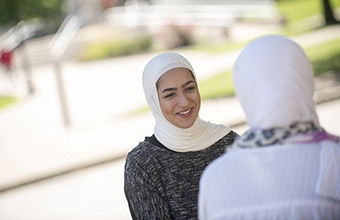College of Arts and Sciences Newsroom

Islam and Social Justice
The progressive ideas of Muslim intellectuals are seldom heard in mainstream and social media, said Sayeh Meisami, assistant professor of philosophy at the University of Dayton. Those voices are often drowned out by the radical views and violent actions of extremists, resulting in a one-dimensional portrayal of Islam.
"Islam and Social Justice: From Philosophy to Practice," a symposium Saturday, Oct. 22, brings four well-known Muslim scholars and activists to campus to discuss the progressive aspects of Islam and how Muslim intellectuals are trying to solve issues related to human rights and equality.
"Unfortunately, over the past decades, the progressive voice of Muslim intellectuals has been lost through the deafening noise of extremism, for which Western media is partly responsible," said Meisami, who co-organized the event with Ellen Fleischmann, professor of history and Alumni Chair in Humanities. "One of the goals of the symposium is to let this progressive voice be heard in this community."
A native of Tehran, Iran, Meisami received both master’s and doctoral degrees in philosophy from the University of Tehran before she emigrated to Canada in 2010 to pursue a second doctorate from the University of Toronto. She joined the University of Dayton faculty in 2015.
Gender justice has been a prominent issue in Iran since the 1979 revolution that resulted in the toppling of that country’s monarchy and led to the establishment of an Islamic republic.
"The issue ranges from the choice for women of what to wear to more crucial and urgent issues, such as the right to divorce and the right to child custody," Meisami said.
She points to the work of female lawyers, scholars and activists who have been fighting these issues for many years, including Shirin Ebadi, an Iranian lawyer and former judge who was awarded the Nobel Peace Prize in 2003 for her efforts in defending human rights and social justice in Iran.
The symposium's speakers include three Shia Muslim intellectuals now living in North America who have had significant impact in the field of social justice both within and outside of Iran. They also include an American scholar whose research focuses on Muslim women in America.
The speakers are:
- Abdolkarim Soroush, an Iranian exile and former professor at the University of Tehran who has been a visiting professor at Harvard, Yale, Columbia and Georgetown universities, among others. In 2005, he was named by TIME magazine as one of the world’s 100 most influential people.
- Forough Jahanbakhsh, associate professor of religious and Islamic studies at the School of Religion in Queen’s University in Kingston, Ontario, Canada. She is the author of Islam, Democracy and Religious Modernism in Iran.
- Arash Naraghi, associate professor and chair of the department of philosophy at Moravian College in Bethlehem, Pennsylvania. His latest book is Critical Traditionalism: A New Model of Reform in Islamic Thought.
- Juliane Hammer, associate professor and the Kenan Rifai Scholar of Islamic Studies in the department of religious studies at the University of North Carolina at Chapel Hill. She is the author of American Muslim Women, Religious Authority, and Activism: More than a Prayer.
Rebecca Whisnant, associate professor and chair of the University of Dayton department of philosophy, said Meisami's work organizing the symposium exemplifies her dynamic contribution to the intellectual life of both the department and University.
“By bringing to UD some of the most prominent voices in contemporary discussions of Islam and social justice issues, she does a great service to the University community as we deepen and expand our efforts toward diversity and inclusion,” Whisnant said.
The University’s Muslim faculty and students represent a broad range of cultural and social backgrounds. Meisami hopes the symposium helps them expand their knowledge of one another and appreciate that they might be facing similar challenges, despite their different backgrounds. She also has invited members of the local American Muslim community, including the Dayton Mercy Society.
'I think this symposium can help our community of students and academics, and the Dayton community at large, to see how Muslims themselves are concerned about a lot of these issues — social justice in particular — and how they are the key to transformation and any possible change in the terrible situation we are in nowadays,' Meisami said.
The symposium is from 9 a.m. to noon in the Sears Recital Hall of the University’s Jesse Philips Humanities Center. Admission is free.
- Dave Larsen, communication coordinator, College of Arts and Sciences
